














Chief Executive: Jackie Lodge jlodge@pwsa.co.uk
Fundraising Manager: Karen Wilkinson kwilkinson@pwsa.co.uk
Support Team Manager: Patsy Lecont plecont@pwsa.co.uk
Communications Manager
Jonathan Horsfall jhorsfall@pwsa.co.uk
Support and Training Officer: Ruth Consterdine rconsterdine@pwsa.co.uk
Support and Training Officer: Sheila Inwards sinwards@pwsa.co.uk
and Training Officer
Sarah Brindle sbrindle@pwsa.co.uk
Office and Finance Manager
Vicki Cooke vcooke@pwsa.co.uk
Office Administrator: Lizzie Pratt lpratt@pwsa.co.uk
Project Manager
Myles Kelly mkellyt@pwsa.co.uk
Welcome to your autumn edition of PWS News.
I hope you all had a fantastic summer. It was certainly a fairly wet one for many parts of the country! At the time of the writing, the unusually hot weather we’ve been experiencing during the early autumn has now started to give way to cooler (and, for many, much more welcome) temperatures. In this edition, we look at useful resources which many families find helpful, such as heuristic play and treasure baskets, as well as how to access relevant events and activities in your local area. We’ve also asked some of our adults with PWS to share with you some of their hobbies and interests, which we hope will help inspire parents in our community wondering what sorts of things their children might be able to do once they get older.
We also have a round-up of all our events and activities from over the summer, with plenty of photos, including our community days, and our fundraising activities. As you can see, our amazing PWS community has been busy!
I hope you enjoy this issue of PWS News and, as always, if there’s anything you’d like to see in a future edition, then please do let me know. This is your magazine and we would very much like it to reflect what our community is doing and what it is interested in!
Until next time, have a fantastic autumn!
Jonathan Jonathan Horsfall Communications Manager jhorsfall@pwsa.co.uk

A reminder that if you need to contact us by post then please write to PWSA UK, c/o Metcalf’s Commercial Decorators, Unit 5, 3 Deer Park Road, Moulton Park Industrial Estate, Northampton, NN3 6RX.
Please do not send anything to our previous PO box address as it may not reach us!
Other portals into the PWS World/Community include: PWSA UK Website: www.pwsa.co.uk
X (formerly Twitter) @ PWSAUK
Facebook: Prader-Willi Syndrome Association UK
PWSA UK Community Hub: Empowering Life with PWS
Facebook community groups: PWS Families; PWS Siblings UK; Prader-Willi Syndrome Support UK; Lovebugs of the UK (PWS); PWS Adults & Carers Unite
PWSA UK Address
PWSA UK, c/o Metcalf’s Commercial Decorators, 3 Deer Park Road, Moulton Park, Northampton, NN3 6RX T: 01332 365676 • E: admin@pwsa.co.uk • www.pwsa.co.uk
Royal Patron: HRH Princess Michael of Kent Patron: Prof AJ Holland
Office opening hours: 9.00am - 5.00pm (Mon-Thu) and 9.00am – 1.00pm (Fri).
Answerphone available at all other times
Instagram: PWSAUK
PWSA UK Sibs Hub (closed Facebook page for siblings)


Definition of a resource: a stock or supply of money, materials, staff, and other assets that can be drawn on by a person or organisation to function effectively.
Hello, and welcome to the support section of our Autumn PWS News magazine. This quarter we wanted
We often get asked by various family members what they can buy that would be fun, and at the same time help their child with PWS. The first thing that springs to mind is a treasure basket or, for older ones, heuristic baskets. To be honest, these are good for all ages, not just children, as they can be very therapeutic as well. So, what is a treasure basket or heuristic play? Well, they originated from a very sad situation that a lady called Elinor Goldschmied found herself in back in 1946. We think it is important to recognise where they came from, so you can really understand their importance.
Elinor was a parent who lived in Italy and worked in an institution for single mothers and their babies. She was profoundly influenced by the effects of emotional and mental deprivation on these babies, and in an interview in 2002 she recalled: “These babies in their cots were ‘closed off’ and when I offered them an object they reached, then drew their hands back. They just couldn’t cope. Eventually, they managed to pick up an object with enormous caution. I then began to look around the environment for other objects. These objects were my first collection, so I did the treasure basket in a context... having play material became part of the daily routinethe staff began to have relationships with those babies too. We were able to reduce the crying and anxiety.” Elinor went on to introduce the treasure basket to hundreds of babies, and began teaching and training in
Our Vision:
Overcome the challenges of Prader-Willi syndrome.
Our Mission Statement:
To ensure every member of the PWS community has access to high quality care, opportunity and support, and to promote awareness, build knowledge and further research in order to overcome the challenges of PWS.
to explore the topic of resources and pull together a helpful “tool bag” of information, links, sign posting and general helpful information for our very own PWS community. Sometimes these can be little details that make a big difference.
There will be a wide range of topics covered, from creative and heuristic play, equipment suggestions, handy hints, restrictive practice, what’s available in our local communities, present suggestions, what is available in local authorities and much, much more.
Also, because the resources referenced are largely aimed at younger children, rather than adults, we have decided to include a few short case studies from adults in our community as a means of inspiration for parents, offering ideas for activities and interests their children can pursue as they approach adulthood.
So, please - sit back, relax and enjoy! And don’t forget, if you have any questions or queries about these or any other matters relating to PWS then our support team can be reached on 01332 365676 or supportteam@pwsa.co.uk
other institutions throughout the country, pioneering the transformation of childcare in Italy.
Of course, our babies and children are not in this dire situation, but it really shows the worth of a basket of objects, and how they can be fun and help with all forms of development.
What are the benefits of playing with a treasure basket?
Sensorial stimulation
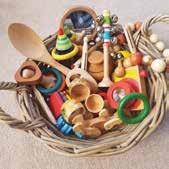
Many toys our children have are bright coloured plastic items, and babies and young children cannot differentiate between them. Objects made of natural materials encourage more exploration and all the senses to be used. Include items that are different textures, different sizes, smells and shapes. They can learn to examine colour, size and textures, the smell of objects, the noise they make, and how they feel when they touch, stroke, pick up and drop objects.
Curiosity
Using a treasure basket will open the world of curiosity for your child. By stimulating their curiosity, it opens their senses to the world and starts them thinking about everything they encounter.
Want to be kept up to date with the latest news?
PWS Weekly Round-Up is a great service offered by the Association to keep you informed about training, family and fundraising events, new research and much, much, more! If you would like to sign up for this service, please contact Jonathan at jhorsfall@pwsa.co.uk or call the office.
Decision making
When they are playing with the treasure basket, it is important not to intervene unless they need you. This will encourage their decision-making skills. It gives them control of their play and provides them with the feeling of control in their environment.
Practice sitting
It helps strengthen their core muscles, balance and coordination. You will be amazed how long they will engage with the basket of goodies.
Gross motor skills
This wonderful basket of items will motivate them to touch, manipulate and explore. Developing the motor skills in their arms leads to the development of fine motor skills using their hands and fingers.
Experimenting
They can become mini scientists, testing what things feel like, how they bend and connect, and of course like all babies, what they feel like in the mouth. They can create theories and test them out trying things we wouldn’t always think of, and finding new ways to play.
Independence
Open ended play means there are no rules about what to do with the items, and no specific outcome. They are in charge, they are making the decisions, they are creating their own learning. They are free to manipulate and experience in any way they wish.
Understanding mathematics
A treasure basket can be the first step to experiencing different weights, measurements, how things roll, bend and fold, and other physical properties of materials.
Total involvement
Children become fully engaged when playing with treasure baskets and focus on the items in the basket and what they can try.
Begin to choose likes and dislikes
Linked to decision making, when observing play you will see certain items played with more than others and each child will be different. This helps them to develop the skill of what they like and do not like, and will be an important tool later in life.
Learning through feel
Babies learn a lot through feel and the information they gather, from using hands and mouths to support their cognitive learning.
Develop their eyesight
During the exploration they will focus on certain items and examine them with their eyes, looking at them intently at close and medium range for a long time.
Brain development
A wealth of brain development opportunities are provided when playing with a treasure basket, as reflected in the list above.
What goes in a treasure basket?
The first thing to remember is they do not have to be expensive! If you search online for treasure baskets, you will find a variety of companies selling them for
extortionate prices. In fact, the only thing you may have to buy is the basket because you will have so many items around the house you can use. Of course, if shopping is your therapy, who are we to stop you? So, what can you put in a treasure basket? Here are some ideas:
Large pebbles
Pumice stone
Natural rope
Ribbons
Curtain rings
Costume jewellery
Spoons
Measuring spoons
Coasters
Leather purse/wallet
Coloured ribbons
Bag of herbs
Heavy chains
Nutcracker
Wool
Felt
Tissue paper
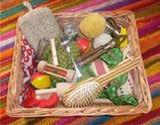
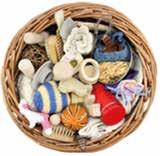
What type of basket do you use?
There are a few things to consider when selecting or buying a basket.
The most important are:
1. Select a basket that is shallow. This helps the babies to reach in independently and take things out.
2. Get a basket with a reasonably heavy base. This will stop the basket over-turning when babies are taking things out of it.
3. Often, treasure baskets are made of wicker. They could also be made from another preferably natural material, and definitely not plastic.
4. Select an aesthetically pleasing basket if you can. If you can’t find a basket, a box or pan you have around the house, that is the right height for your baby to access, will work just as well.
What is your role?
Your role is to sit back and watch their exploration, fun and experimental play. There may be times you need to step in if they can’t reach something or become frustrated, but don’t rush in. Let them explore how they can resolve the problem first. You will be amazed how long a child will remain engrossed and how much fun they have with this activity.
What comes next?
Depending on the child, they move from treasure baskets to heuristic play. This usually happens when you sense they are ready for larger items, exploring things in more detail and showing an interest in putting things together like specific colours or sizes. There are no specific rules - it is between you and your child. They will let you know they are ready to move on, or if they want their treasure basket back. For heuristic play,
the basket is no longer needed. Gather the items you need and spread them out on the floor or a large tray (builders’ trays are perfect) for your child. The role of the adult remains the same as with the treasure basketa supervisor who can sit back and watch play unfold.
Heuristic play was a term coined by the child psychologist, mentioned in the treasure basket introduction, Elinor Goldschmied. The word heuristic comes from the Greek “find” and as an adjective means “enabling a person to discover or learn something for themselves”. In heuristic play for toddlers, when they have graduated from the treasure baskets, you give them a collection of objects that are similar with a collection of containers. Children will then make connections and observe the properties of the “objects”. It could be a set of spoons and various boxes. It could be a set of blocks and various fabrics... the possibilities are endless, and you don’t have to purchase anything special. I’m sure you will find many ways to offer this kind of play with what you have at home.
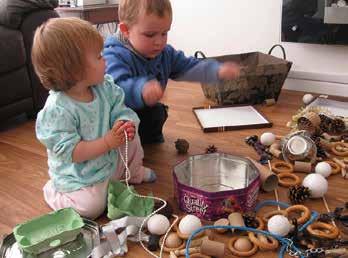
As with treasure baskets, there are many learning opportunities in heuristic play. Unlike treasure baskets where you have lots of different items, in heuristic play you have sets of items they can match and explore. This helps to:
Improve sensory and cognitive skills
Children can use multiple senses to explore the items and use a combination of sight, sound, smell, touch and taste. This creates a rich sensory learning environment and this is particularly satisfying for babies and toddlers that rely on their senses for stimulation.
Exercises children’s creative thinking and imagination
If you think about many toys, the child has the play outlined for them such as push a button and it will make a noise, pull the string and the toy moves. With heuristic play, they can let their imagination run wild by seeing what happens when they put a ball in a box and shake it, what noise does a spoon bashed in a saucepan make, the different sounds made by items in different size boxes - it is endless. This means they are
developing their imagination, and they have to choose what to do and how to make things work.
Encourages problem-solving and critical thinking
When a child isn’t following instructions or playing with repetitive toys, they get to explore how different actions can lead to a different range of outcomes. This helps to develop their critical thinking and how their actions have consequences.
Builds confidence and concentration
Having a large number of objects provided allows them to choose what items they want to explore. These are important opportunities to build their confidence as they have independence in their play. This prepares them for future interactions with real world objects, and makes them more curious and confident rather than anxious when facing new scenarios.
What items can you use in heuristic play?
Here are some easy ideas for items that will work well in an early years heuristic play setting for babies, toddlers or young children:
Assorted household items, such as dolly pegs, hair rollers, or door stops.
A variety of containers, such as egg cups, bowls, and plastic containers.
Throwaway cardboard, such as egg cartons, cereal boxes or toilet roll tubes.
Assorted paper, such as notebooks, tissue paper, or greaseproof paper.
Furry objects, such as pompoms, soft toys, or fuzzy socks.
Scented objects, such as bags of herbs, lavender, or empty perfume bottles.
Natural items, such as lemons, avocados, acorns, or leaves.
Rough or coarse items, such as sponges, a nail brush or pumice stone.
Soft objects, such as makeup brushes, flannels, cotton buds, or a velvet ring box.
Rubbery objects, such as bathtub plugs, rug grippers, or hot water bottles.
It is always important to consider the safety of some of these objects as with all children their mouth will be the first place for them to explore the items. Adult
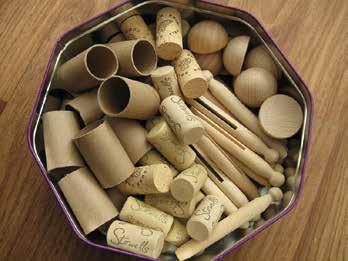
supervision is required at all times, but still allow the child to explore without adult intervention. Here are some important safety tips:
Give all household items a good wash to get rid of dirt and bacteria before letting children play with them.
Take care to avoid using any items that are small enough to present a choking hazard.
Avoid keys and coins or any items that are high in lead to avoid children ingesting heavy metals. Avoid putting any chemicals, liquids, or edible materials in your heuristic play setting. If you choose to use bottles of perfume, spice jars or vanilla essences, for example, make sure the containers are completely empty. They should still retain their interesting scents without their contents!
If using leather objects, use real leather rather than imitation as this is coated in PVC which is harmful to ingest.
Mum Emma Nye shares the benefits of a tuff tray when it comes to play – particularly when the play gets messy!
I love our tuff tray. I’ve had it since Isaac was about one year old. Before that, we had a smaller-type table but that could only have one child at a time playing in it. We do so much with our tuff tray - it’s great for putting small toys like LEGO on, so I don’t end up standing on it. But what we really like doing is messy play.
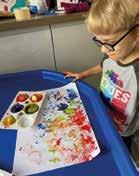
Some of the simplest activities we do are sea animal toys with stones and water. Good old Amazon provided the sea animal and some of those glass pebbles, the rocks I picked up from the garden (we had lots of those smooth stones like you get at the beach) add some water and my kids will play for ages. I did get some fish tank fake plants too. This week we decided to add some ice blocks which added a whole new dimension to the play.
Other things we like to do are water beads, containers and cups - you just have to watch closely if you have a little one so that they don’t eat them. Cornflour and water is tons of fun too, if a little messy. If I don’t fancy the mess, we’ve even just got pom-poms out for scooping and colour matching (I used an egg box and cut holes in the bottom cups and then coloured the bottoms to match the pompom colours) and the kids used giant tweezers or chopsticks to pick up and match the colours. Jelly baff is fun too. One of the easiest messy play ideas is just a bit
We hope this information has given you some ideas on activities you can create, often without leaving the house or having to spend lots of money. It would be lovely to see some photos of the ones you do in action, so please do send them in!
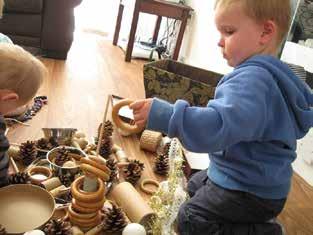
of washing up liquid in a little water and then use an electric whisk to whizz up some bubbles. Potato print painting, foam clouds and coloured rain drops (that one ended up a real mess but was tons of fun). Potion making with old herbs and spices and flower petals was lots of fun too.
Because we love messy play so much, I also got a book that had loads of amazing ideas including lots of babysafe paint, dough, slime and sand, which is great if you have a child that likes to taste things (my youngest, who is non-PWS, loved crunching play rice). I didn’t tend to do food-related items with Isaac except for play rice and dried pasta, for obvious reasons, and supervised closely, but he never really tried to taste anything (unlike his little sister).
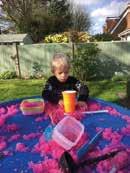
I use the tuff tray all the time, I found it a great incentive for Isaac and standing to play (we never really got any input from physio or OT, so I found my own ways on helping Isaac). He is 9 now and we still use the tuff tray every day. At the moment, we have small toys out, threading, peg boards and magnetic shapes (stuff I don’t want all over the floor!) but later the water and animals will be coming out. The best thing about the tuff tray is that you can just use the tray on the floor (we’ve had sand and water in it and made a fake beach) or use the stand which has three different levels of height. They even do a mini one now.
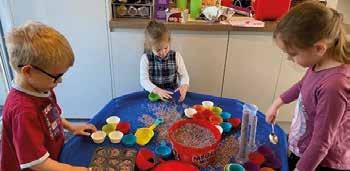
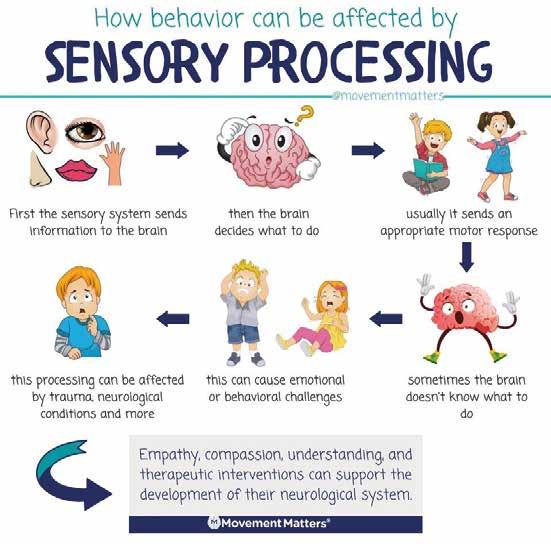
Parents have often described their children and adults with PWS as having difficulty with sensory regulation. This could be connected to their decreased sensitivity to pain, skin picking and sleep issues. At present there is no research to explain why this happens and methods of support. There is an information sheet called The Young Child with Prader-Willi Syndrome: Physical and Sensory Issues and Recommendations by Janice M. Agarwal, which outlines what you might witness and what you can do to help. You can find it by going to www.pws.org.nz/ support-management/school-support and then scrolling down to Additional Resources, where it is (at the time of writing) the second item listed.
What is a restrictive practice?
Section 9 of the National Disability Insurance Scheme (NDIS) Act 2013 defines a restrictive practice as ‘any practice or intervention that has the effect of restricting the rights or freedom of movement of a person with disability’
Restrictive practice is used to stop a person from doing behaviours of concern. A behaviour of concern might be one where the individual with PWS hurts themself or another person. For example, they might be angry and break furniture, or they might run away from people who help them.
What are the 5 restrictive practices?
An overview of the types of restrictive practices including chemical restraint, environmental restraint, mechanical restraint, physical restraint and seclusion.
What is an example of restrictive intervention?
Interventions that may infringe a person’s human rights and freedom of movement, including locking doors, preventing a person from entering certain areas of the living space, seclusion, manual and mechanical restraint, rapid tranquillisation and long-term sedation.

We will all apply restrictive practice in some form with all our children and loved ones, such has having baby gates to prevent a toddler going up or down stairs on their own of their own free will, locking the doors at night to prevent children from leaving the house, and medicines stored on top of a cupboard so they are out of reach of children are all classic examples of restrictive practice and as long as they are justifiable, necessary and propionate they are fine to be applied. Care homes and residential settings need to be very transparent and ensure that their residents are care planned for anything like this and that when they are used, they are fully documented.
What is an example of a hidden restraint in care?
Hidden restraint refers to restrictive practices that are unintentional. For example, bed rails may be used to prevent an individual from falling out of bed, but they may also prevent them from getting out of bed on their own.
As a support team, we are often asked about adaptations and equipment for your loved ones, and where these are available. For all children and adults with PWS, any adaptations and equipment should be provided by an occupational therapist, also known as an OT. This will vary from region to region, and the information below offers an understanding of what occupational therapy is, how to access it and the adaptations and equipment you can ask for.
What is occupational therapy?
Occupational therapy aims to improve the ability of your son or daughter to do everyday tasks that they may find difficult. Their aim is to help people improve their ability to function as independently as possible so that they can participate in whatever activities are meaningful and important to them.
How can an occupational therapist help my son or daughter?
An occupational therapist can help your son or daughter to choose and use special equipment like wheelchairs and aids for mobility, eating, dressing or any other activity. They also help to adapt people’s homes to accommodate their individual needs.
However, this is not all OTs do – they can also help your son or daughter to improve their motor functions by providing physical exercises to improve strength and dexterity, or special exercises to help with sensory or communication problems.
And that’s not all – they can also help by designing new ways for your son or daughter to perform the tasks or leisure activities they need or want to do.
How do you lawfully restrain someone?
The person taking action must reasonably believe that restraint is necessary to prevent harm to the person who lacks capacity, and the amount or type of restraint used, and the amount of time it lasts, must be a proportionate response to the likelihood and seriousness of that harm.
It is an intervention It controls a person’s freedom to help keep them safe It may take away your rights as a person with a disability
How do I access an occupational therapist?
You can access an occupational therapist free through the NHS or social services, depending on your situation. If you already have a social worker, they can very easily refer you to the OT within their department. For those of you that don’t have a social worker, your GP will be able to make a referral for you. Equipment for your loved one is provided through an OT linked to social services. However, for home adaptations, you will need an OT from your local council. Again, your current social worker or GP can refer you.
We hope you find this information useful, and remember we are here to help. We can write you a support letter, and liaise with your local council or social services department on your behalf. You don’t have to face any of this alone – we are just a phone call or email away, so please contact us on either 01332 365676 or supportteam@pwsa.co.uk
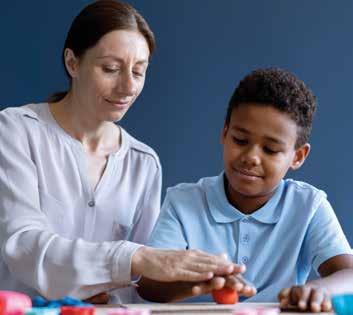
A local offer gives children and young people with SEND, and their families, information about what support services the local authority think will be available in their local area. Every local authority is responsible for writing a local offer and making sure it is available for everyone to see.
You should be able to find your local authority website by clicking this link and entering your postcode: www.gov.uk/find-local-council
If you live in a county like Leicestershire, the local authority is Leicestershire County Council. However, you may also have a district or borough council and there are six of these in Leicestershire.
If you live in a city, your local authority is likely to be the city council. There are also metropolitan councils so it can get a bit confusing.
Some local authorities (LAs) have really user-friendly websites and other tend to hide things away which makes them difficult to navigate. We’re going to use Leicestershire as an example.
You can see immediately on their home page a heading for children and families and within that a sub heading for special educational needs and disability.
If you cannot find children and families or education on the home page of your LA, use the search box and type ‘SEND local offer’.

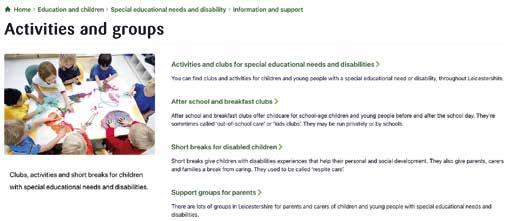
Although the home page for LCC was promising, it still took several clicks to find the page we were looking for with details of the local offer including short breaks, activities and support groups.
Once we had clicked onto Activities and Clubs for SEND, we got a wealth of information with links to directories of play parks, clubs and organisations including national and local charities, and how to apply for access cards and discount cards at various venues including cinemas.
The example on the right is from the Nottinghamshire County Council website and is much more user-friendly – once you find it, that is. We couldn’t see anything on their home page, but we put ‘SEND local offer’ into the search box and this is what came up: we clicked on the ‘Days Out’ box and there were three pages of ideas and support for days out.
The search box is not always helpful, but you may have heard of SENDIAS – Special Education Needs and Disabilities Information and Advice Service. Most LAs will have a SENDIAS team although some have outsourced it to other agencies such as Kids Co, and some call it something completely different. In our
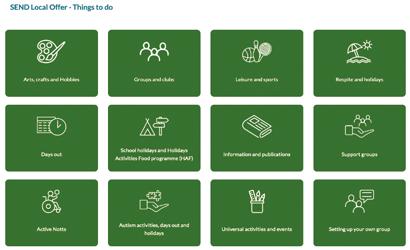
example, you would be forgiven for thinking that LCC doesn’t have a SENDIAS service because putting it into the search box from their home page or even the SEND page brings up absolutely no results whatsoever. In order to find this page, we had to Google SENDIAS Leicestershire and guess what? There is a page on the LCC website for it.
From the SEND Code of
Information, advice and support
All local authorities, by law, have to provide children and young people with SEN or disabilities, and their parents, with information and advice. There is an information, advice and support service in every local authority area. These services provide factual, impartial and confidential information, advice and support. They will be able to offer this face to face, by telephone and online. They will be able to offer support in preparing for and attending meetings, expressing your views and participating in decisions made about your child’s education, health and social care. More information locally
Contact your local Community Voluntary Service (CVS) or Volunteer Centre to find out what’s happening in your locality. There are often lots of different groups running all sorts of activities – a quick search in the Leicestershire area came up with a jigsaw library, ‘Dr Lego’s brick workshop’, music and movement including seated exercise, craft and chat, and a knitting and crochet group. The trick is knowing where to look for all of these things and if you need help, please call on us and we will see if we can give you some guidance.
Scotland
CVS - https://scvo.scot/
SEND Support & Information Enquirehttps://enquire.org.uk/
Wales
Family Information Service - www.gov.wales/ find-your-local-family-information-service
Northern Ireland
SEND support www.eani.org.uk/parents/ special-educational-needs-sen
Other useful organisations
Contact. For families of disabled children: https://contact.org.uk/
Action for Children www.actionforchildren. org.uk/our-work-and-impact/children-andfamilies/families-with-disabled-children/
Disabled Children’s Partnership https://disabledchildrenspartnership.org.uk/ about-us/ Kids www.kids.org.uk/

Many of the resources mentioned tend to be geared towards children with PWS, rather than adults – but we didn’t want the adults to be left out! Instead, we asked some of our adults to tell us about what they like to do in their spare time as a way of providing inspiration to parents about what their own children could pursue when they get older. As always, this will depend on the individual and their abilities and interests, but should still provide you with some ideas!
Joshua Madagan
My name is Joshua Madagan. I sing in the Include Choir every Wednesday evening and really enjoy talking to my friends that are there. We also do a ‘sing and sign’ session sometimes on a Saturday morning at different outdoor areas around Surrey and also we do performances in London.
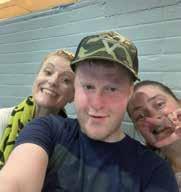

These are my Zumba instructors. Their names are Louise and Daisy. I like Zumba because it makes me feel healthy, with lots of energy.
I like working for Avon because it gives me the opportunity to meet new people and earn extra money. Every month, I give out books
to my customers then collect all the orders in. Then I put them on the system and wait for them to be delivered. Then I put them in them in bags with professional stickers and then arrange with my customers what day is convenient. Lastly, I deliver their products and collect the money from them and pay the bill and then any money that is left over is mine.

Compiled by Ruth Consterdine

We know that lots of parents are interested in supporting their young person to find suitable work opportunities and with this in mind we have put together some information about where to get help with this.
If your young person has finished their education, they might be thinking about going into the world of work. We know of a number of people with PWS who work, including being a steward at a football club, working in a dog grooming parlour, and working for Transport for London!
Did you know that local Job Centres have work coaches who can help your young person find a job or gain new skills and tell them about disability-friendly employers in your area?
Intensive Personalised Employment is one-to-one support and training that supports young people with disabilities to find work that is suitable to their particular needs. Young people get a dedicated support worker to help them:
Identify what work they’re able to do and match their skills to work that’s available and manage work around their specific disability
Get training to help them find work and to build a personal support network
Support them for the first 6 months of work
They can get an additional 6 months of on-the-job support if you find employment. How to apply:
Ask your work coach if you’re eligible or go to your local Jobcentre Plus and ask to speak to a work coach about Intensive Personalised Employment Support. Find out more at www.gov.uk/intensive-personalisedemployment-support
The What Works Centre for youth employment recently launched the world’s first Youth Employment Toolkit that presents the global evidence on seven key interventions
New research published by Pro Bono Economics and the Disabled Children's Partnership has found that £60million of public money was wasted on SEND tribunals in 2021-22.
The key findings from the report are:
There were 11,000 tribunals lodged in 2021-22, up 29% on 2020-21
that support young people facing disadvantage into employment. It’s free, online and easy to use. The Toolkit is designed for policymakers, employers and practitioners who need a good quality evidence resource when making decisions about what works to improve youth employment outcomes. Find out more at https://youthfuturesfoundation.org/toolkit
The National Development Team for Inclusion (NDTI) Time to Talk Next Steps is registering new young people aged 16-25 with additional needs onto its free online support and self-advocacy programme. This life-changing online programme is currently open for new referrals. Its team works with young people across England to provide virtual one to one support to build confidence and help navigate life's challenges. Young people don't need to have a diagnosis or Education Health and Care Plan (EHCP). It also provides support to parents and carers through its partnership with Contact, and welcomes direct requests from parents, carers and professionals, and always asks that young people are aware of a request made on their behalf. Find out more at www.ndti.org.uk/projects/time-to-talk-next-steps
Disability Rights UK runs a Disabled Students Helpline which offers information and advice to disabled students, apprentices and trainees by phone and email on a range of topics including:
Applying to college, university and apprenticeships
Telling people about your disability
Financial assistance
Adjustments for disabled students and apprentices
Rights in post -16 education and training under the Equality Act 2010
How to resolve any disagreements.
The helpline supports disabled students, apprentices, parents and carers and professionals supporting disabled students aged over 16 in England.
Opening hours: 11am-1pm on Tuesdays and Thursdays. Telephone: 0330 995 0414
Email: students@disabilityrightsuk.org
Councils lost 96% of tribunals that progressed to a hearing
Lost tribunals cost taxpayers £60m, split between councils and courts
Wasted money could fund nearly 10,000 places in SEN units in schools
The current EHCP process can impact development of children and young people and put financial strain on families
Read the full findings at www.probonoeconomics.com/ wasting-money-wasting-potential-the-cost-of-sendtribunals
In the USA, Aardvark Therapeutics, a clinical stage biopharmaceutical company, has reported receipt of a Rare Pediatric Disease Designation in PraderWilli Syndrome (PWS) from the Food and Drug Administration (FDA) for its lead programme, ARD-101. This designation means Aardvark is eligible for a Rare Pediatric Disease Priority Review Voucher when ARD101 receives approval in PWS. The early clinical study results suggest a promising future for a new class of pharmaceuticals that could benefit people with PWS who are challenged by insatiable hunger (hyperphagia) and aggressive food-seeking behaviors. Thus far, no drug has been approved by the FDA to treat the hyperphagia associated with PWS.
In a previous Phase 2 study of ARD-101, Aardvark enrolled 12 volunteers with PWS to take ARD-1o1. Based on promising results from this study, the Foundation for Prader-Willi Research (FPWR) has provided a second round of financial support to assist Aardvark with enrolling additional volunteers to explore the impact of higher doses on hyperphagia.
ARD-101, is a first-in-class oral medication that has shown promising activity in reducing hunger cravings in clinical studies and promoting weight loss in preclinical studies. ARD-101 is substantially gut-restricted and has minimal systemic exposure. It is postulated that ARD-101 conveys its systemic effects by activating secretion of several gut peptide hormones, including glucagon-like peptides-1 and -2(GLP-1, GLP-2), and cholecystokinin (CCK). Gut CCK is considered a "satiety signal" that acts via the gut-brain axis to control hunger. PWS patients have a normal CCK receptor but their CCK release from gut enteroendocrine I-cells in response to food is impaired, leaving PWS patients with a continuous sense of extreme hunger. Phase I studies demonstrated safety and tolerability in healthy human volunteers. Three Phase 2 studies have demonstrated an impact on hunger suppression.
Also in the States, Harmony Biosciences plans to launch a Phase 3 clinical trial by the end of this year to investigate whether pitolisant, which is normally used to treat sleep disorders such as narcolepsy, can safely and effectively reduce excessive daytime sleepiness in children, adolescents, and adults with PWS.
If positive, the findings would back an application for regulatory approval of pitolisant for PWS.
The design of the upcoming study in PWS patients was discussed with the US Food and Drug Administration (FDA) in an end-of-Phase 2 meeting. Top-line data from the Phase 2 study offered evidence that pitolisant could safely ease daytime sleepiness in PWS patients of all ages.
Excessive daytime sleepiness has been reported to affect between 52% and 100% of those with PWS. Like hyperphagia, it is thought to arise from a dysfunction in the brain’s hypothalamus, an area responsible for maintaining the right balance in the body’s core functions — including between sleep-wake states, and hunger and satiety.
Pitolisant is an oral treatment that is thought to ease sleepiness by boosting the release of histamine, a molecule that promotes wakefulness, in the hypothalamus.
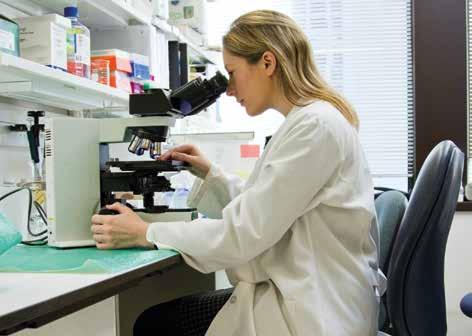
by Sarah Brindle
The day started with a super excited Sarah up and ready for the journey to Scotland from the North West.
I arrived and WOW – amazing, beautiful, and totally stunning. Scotland truly is bonny. I was positioned outside reception, as I promised, waiting to give everyone the very secret password of: “I am with PWSA”.
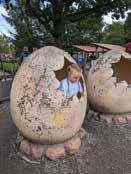
The animals were slowly starting their lazy morning routines: lions yawning, monkeys grooming each other, and giraffes licking their lips.
Elaine had managed to get us the super posh marquee where we could all gather for lunch. Lunchtime soon
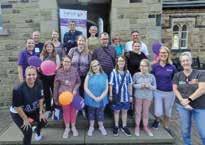
by Linda Jenkinson
We had a great day, with 8 families and one parent and her mum. This was good for them as they don’t know any other families, so was good for them to meet everyone else.
Tracey’s Zumba was a great hit once again and her fans I think tired her out! I managed to fit a BSL group in at one of the few cool down sessions. The young people also enjoyed some arts and crafts too, and they enjoyed
Thank you to everyone who came along to our PWS community day at Waterways Farm, Norwich, on 13th August. We had a fantastic day and, as you can see, we were very lucky with the weather too, when the forecast hadn’t been too good!

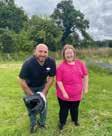
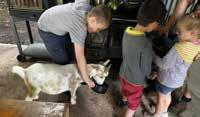

approached and everyone settled to refuel ready for stage two of our adventure. Team Blair Drummond Posse was safari ready once again.
As the adventure ended, there were lots of tired people, and some of the animals’ enclosures looked quite inviting for a little power nap before our journeys home.
Goodbyes were said – but only for now, and good memories made new friendships and bonds. Massive ‘thank you’ from me for your warm welcome and here’s to getting to know you all and supporting you more over the coming years.
Your next Scottish event will be the Christmas party on the 3rd of December 2023 from 12 midday until 3pm at Cojacs. I sadly won’t be able to come and see you, but we hope you all have a super time and send us lots of photos!

their drinks and juicy watermelon snack.
It was a wonderful day and so rewarding to see the young people old and new getting on so well and meeting up again after a long while. It was also lovely to meet new parents and see them meeting each other too.
A special thank you to Denise, a dear friend of mine, who joined us on the day to serve refreshments. We couldn’t have run the day without her! Thank you very much Denise, very much appreciated!
Also special thanks to Tracy, our Zumba expert, who was fantastic with our young people! Thank you very much, Tracy - very much appreciated!

Thank you to everyone who joined us for our community day at MOD Lyneham. We may have had wet weather, but we still had a fantastic time!


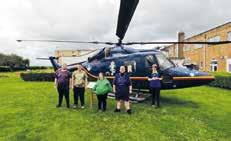

Happy Birthday!
Caspian Abdolahi
Junaid Ahmed
Isabella Bailey
Violet Belle Blake
Thomas Brandon
Alex Bremner
Layla Curzon
Theo Graham
Rose Gray
Ella Harker
Freddy Harvey
Poppy Langmead
Hope Layzell
Osian LLewellyn
Gideon Lowe
Hannah Macharia
Colette McIntyre
Callum Munro
Peggy Nesbit
Samuel Noble
Noel O’Brien
Laura Oomen
Lilou Oupinie
Willow Paris Railton
Chloe Pattemore
Miia Rose Preece
Louis Purser
Thomas Ramage
Imogen Rawlinson
Robynne Ricketts
Shaira Shah
Ocean Squires
George Stevens
Sophia Stevenson
Tanvi Thanki
Neva Thirlby
Evie Thornhill
Alben Valsinger
Scarlett Walton


Here at PWSA UK, we are always looking for new and exciting fundraising events and we are already planning for 2024. Some of the events and dates are yet to be confirmed but please let us know if you are interested in any of the below, as the more interest we have, the better!
Please contact either Karen at kwilkinson@pwsa.co.uk or Lizzie at lpratt@pwsa.co.uk
Now this event is already filled for 2024 but if you would like to take part in the iconic London Marathon in 2025, please register your interest now! Erin, who ran it for us this year [and you can read her full account elsewhere in this section] said: “My family and friends absolutely loved it; they all had the best day ever, as did I. Thank you for giving me the opportunity to run in support of you. It really was an absolute honour. Thank you again for all you do. I think my family would be a bit lost without the PWSA!”
If you missed out this year, have no fear as we are back to test our nerves with the Skywalk: The Edge at the famous Tottenham Hotspur Stadium. We have 8 tickets available to walk up the side of the stadium and round the golden cockerel with the option to abseil back down.
Are you interested in jumping out of an aeroplane thousands of feet in the air?! If so, this may be for you. We are currently planning this hair-raising event at
Thank you to our three amazing runners who completed the Great North Run to raise funds for PWSA UK! We asked each of them to share their experiences with us.
Lindsay Hill: “Really enjoyed it - it was challenging in the heat but I did it in 2 hours 19 minutes, which was quicker than I anticipated. The storm hit as I was waiting for the ferry back to North Shields, so was one of the lucky ones not to get stranded at South Shields.”
Louise Desmond: “Wow!!! What an AMAZING experience, I loved every minute of it! It was a tough one but I would do it all over again tomorrow if I could! I feel so grateful that I managed to raise £625 for such an amazing charity that supports my

Langer Airfield, Nottingham. If you would like to know more about this once in a lifetime event, please let us know. Jodie said: “I was absolutely terrified, but my daughter who has PWS has such major issues daily, that I thought I needed to get on and put myself out of my comfort zone. What an amazing experience it was, and I loved it, whilst raising funds for the charity that supports us. I want to do it again.”
We attended our first event at Windsor Great Park this year, and let’s just say it’s not one to be missed. With a 1k, 5k, 10k and sensory 1k course you can run or walk, this event has something for everyone.
How amazing does this sound… watching the sun rise over the beautiful Snowdonia National Park. We are planning to set off on our trek up Snowdon at 1am to reach the summit at 5am to witness this unforgettable experience. Currently there are 25 places available, let us know if you are interested!
This half marathon takes you over the famous Tyne Bridge from Newcastle to South Shields. We are hoping to have some special guests take part in this race, so keep your eyes peeled for training updates and let us know if you’d like to join.
We would like to thank anyone who has previously taken part in any of our fundraising events, anyone who is thinking of joining the events above and of course those of you who have held your own events and taken on your own challenges – we are so grateful.
Events are so important as they not only raise awareness for PWS, but they help us raise vital funds to support our research projects, community days and most importantly we can keep our help line open to offer guidance and advice when needed.
beautiful second cousin, Ellie.”
Lucy Jeffries: “The heat at the beginning was horrendous, but thankfully it cooled down around mile 6 and got overcast. People collapsing all over the place which I hadn’t seen before! I managed to make it to the end before the end, collected my bag and was heading to the coach when the heavens opened and literally within minutes I was soaked. Very glad it’s done and incredibly proud of the money we’ve raised so far!”
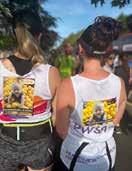


A massive ‘thank you’ and congratulations to Alan Auld, dad to Iona, who undertook four mammoth swimming challenges in aid of PWSA UK, raising an incredible £11,000! Here, Alan tells us about his experiences.

In December 2022, I decided I would raise money for PWSA UK and undertake four major marathon swimming challenges in the summer of 2023 - Lake Coniston, Lake Ullswater, Lake Windermere and the English Channel. This wasn’t going to be easy. I started my relentless training and, due to the temperature, this was carried out mostly in the pool. Gradually, I increased my mileage and as the outside water temperature increased, I ventured out to the open water. This challenge was to be done with no wetsuit so living in Scotland the water was rather cold. Luckily, great weather in June heated up the water and my mileage increased to about 40km a week.
I completed my 6-hour continuous swim qualification for the channel in June and I was feeling ready for all the challenges.
In late June, in perfect conditions, I completed Lake Coniston 5.5-mile swim and felt really good. For this challenge, I was accompanied by my wife, Elaine, who completed the distance and did amazingly. In late July, it was time to take on Lake Ullswater, an 8-mile swim. The conditions for this event were dreadful - continuous rain and strong wind causing the lake to be choppy. I battled through the weather and got the distance done.
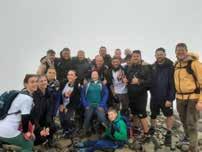
Thank you and well done to everyone who joined us on 17th September to climb Scafell Pike, England’s highest mountain. It was extremely hard work, but we all had an amazing time!

Among those joining us were a team of 12 from Shield Scaffolding, Mechanical & Electrical. Here’s their report from the day:
“Despite the wind, cold and low hanging clouds, each member
I was rather cold at end but another one done.

Mid-August I then made my way to Dover for the big one. I waited a good few days for the weather window to be favourable. At 1am, I left the comfort of the support boat and swam to the shore. My swim then started with my dream of reaching France. After about 12 miles, I began to feel ill and started to struggle and came back on the boat where I was violently sick and had to return to Dover.

I was on a total downer as I had trained so hard.
Two weeks later, after some major battles in my head, I swam Lake Windermere - 11 miles. My challenges were completed.
These were never going to be easy, but I did my best.
Due to the kindness of my friends, I raised a staggering £11,000 for PWSA UK, and also raised lots of awareness for the condition. Although my challenges were hard, this is nothing compared to what our families with PWS have to go through on a daily basis. I feel honoured to be part of this community.
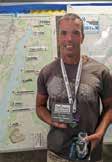
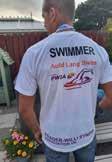
of our team braved the elements to reach the top of England’s highest mountain for a cause close to all of our hearts. We all look forward to supporting this amazing charity and the work that they do once again in the not-too distant future. We’d like to thank everyone that donated and in particular those that gave up their time to make this event the resounding success that it was.”



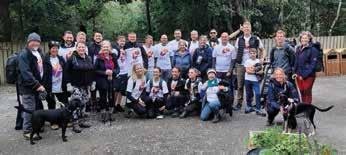
Thank you and well done to Vicki Meanwell, grandmother to four-year-old Elodie, who overcame her fear of heights to brave a wing walk in aid of PWSA UK, raising £900! Here's Vicki to explain more:
"We knew very little of the condition [when Elodie was born] so turned to PWSA UK for support. Since then, I have completed a fundraising challenge each year and this year I decided on a wing walk. On August 12th, I went to Headcorn Aerodrome where I had booked in with the Wing Walking Company. I was given a safety briefing and then had the 10ft climb up onto the top wing of the vintage Boeing Stearman bi-plane.
"I am no adrenaline junkie and I am scared of heights so I was terrified, but the staff were very upbeat and really put me at ease. The first thing you notice when you are 600ft up and travelling at 120mph is the wind. It hits you right in the face until your cheeks start to wobble. The pilot then starts the routine of zooming through the sky with a series of manoeuvres - it’s cold, it’s windy, it’s noisy, but also thrilling and brilliant. I held on for dear life as we dived 500ft. This is an experience not to be missed and I recommend it if any of you out there want to do something a little different."
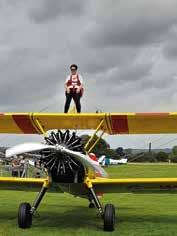
Thank you and well done to Sharon McCafferty, who raised an impressive £670 for PWSA UK by holding a cake sale. Thank you to everyone who supported her!

During PWS Awareness Month, children in both key stages at Burnopfield Primary School had an assembly to raise awareness of the condition and how we are all different but all equal. They also wore orange for Go Orange Day, with donations made to PWSA UK.
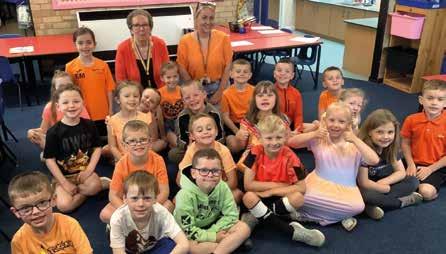
Thanks to an amazing suggestion from the Owl Focus Group of adults with PWS, we have joined the Hidden Disabilities Sunflower and developed a Sunflower lanyard and information card specifically for our community at PWSA UK.

The Owl Focus Group wanted the lanyard to show they have a disability, and if a situation arises in public, it isn’t them but their PWS. This really resonated with us, which is why we have worked so quickly to provide bespoke lanyards and Sunflower cards.
The Sunflower icon originated in 2016 and quickly rose to popularity in 2020 during the pandemic. The now famous flower is still growing and becoming recognized throughout the world having recently been recognised by the government of Brazil as the official symbol for those with disabilities. The Sunflower lanyard and card are sold together and cost £5.95 including P&P.
Get yours now at pwsa-uk.ecwid.com!
We are delighted to announce that PWSA UK has been awarded £500 from Costa Community Grants.
Thank you to Costa for this funding, which will help us to continue to support our amazing PWS community!
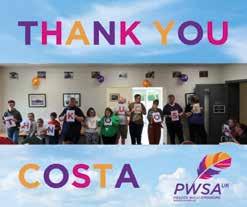
We attended a new event, Parallel Windsor, in July at Windsor Great Park. The event was fantastic with a range of run/walks from the 1km sensory walk to a 5 or 10k distance. Patsy and Millie came along and completed the sensory walk. Millie told us what she thought of Parallel Windsor. Did you like the event? Yes, especially when I met Ellie Simmonds. It was such a pleasure to talk about swimming and Strictly.
Did you like the walk? Yes, I loved that everyone was in colourful costumes and I liked that a lady was wearing a sunflower dress because it stands for hidden disability.

What was your best bit about the day? The festival because there was a lot to see and do. What was your worst bit about the day? The people that were fully dressed up because I get very scared. Sam also had his photo with Ellie Simmonds and did a fantastic job of raising £1,787 - what a star. Flora and Alexandra were amazing and completed the 10k on a lovely sunny day.
Alexandra told us: “The Parallel Windsor event was very well organised for people with different needs, so they can walk or run their preferred distance in km. Everyone
We mentioned Erin Burnett in our London Marathon round-up in the last edition of PWS News, but Erin has now shared her experience in more detail, which we are only too happy to share with you all!
I was absolutely honoured to be given the opportunity to run the London Marathon in April 2023 for the PraderWilli Syndrome Association UK. It has always been a goal of mine to run in support of my little cousin, Sam, and all those who like him have PWS. It meant the world to be to be able to tell him that I was going to be running for him and raising lots of money to support such a fantastic charity which offers so many families, including my own, an invaluable lifeline.
I never thought I would be able to run a 10k, let alone a marathon so this really was a challenge for me. However, I would facetime Sam whilst out on my runs which would get me through. He would always make me laugh and it would remind me why I was doing this - so that people like Sam could continue to be part of a community which always encourages them to shine their light. Marathon day was so incredibly special – I had my family and friends there to support me, and whilst Sam couldn’t join us, it gave me comfort and courage knowing he was watching at home live on TV. He sat and watched all day long to see me cross the finishing line. It was such an emotional day for several reasons, and I remember hearing ‘Sweet Caroline’ at mile 18, Sam’s favourite song, which helped me to keep pushing through. My aunt and cousin Louisa, Sam’s mum and sister, were
can do one of the routes!
“I completed the 10km walk, together with my friend from the PWSA who also came for the day. During the run or walk, there were water stations where we could get something to drink. Many supporters were cheering us on and holding signs to show us the right direction. At the end of the walk, the participants received a goody bag and a medal they earned for the walk!
“After the event, I went to explore some the stalls that were set up on the grounds: there was one with a beautiful racehorse, and another one with birds of prey: I held a Harris hawk for a few minutes, while my other friend M held an owl. This was good fun too.
“I would like to do it to do again and would recommend this to other PWSA families.”
After the walk/run there were plenty of stalls to look at including arts and crafts, many other charities, archery, football shoot outs, an animal sanctuary and one of the Queen’s race horses also joined in the fun.
This was first event we have attended with Parallel Windsor, but we will definitely be going again on the 7th of July next year. Watch this space for tickets.
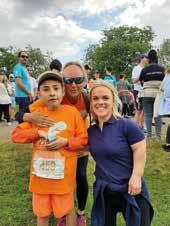
also there supporting me and managed to dot themselves around London to help cheer me on. It felt so special to know that I was doing this for them. It was also such a relief to be able to see Karen and everybody from the PWSA at mile 20, when things were getting tough!
Running the London Marathon was an experience I will never ever forget.
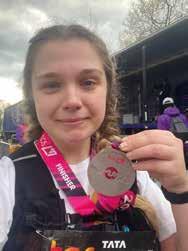
But something that I will also always remember is the generosity of all those who donated to the PWSA, particularly during a cost-of-living crisis. I am so grateful, as are my family, to everybody who donated to a charity that is so important to us.
To anybody who is thinking of running in support of the PWSA – whether that be the London Marathon, a local 10k, or even walking – I would so strongly encourage you. Whilst at times it was tough training in the dark and rain after uni, it was the thoughts of my family and the work that the PWSA do for all those in a similar situation in the UK that got me through.

Ten members of the Community Learning Disability Team. 20 sore feet. 21 miles to cover. 27 degrees heat. Over £400 raised (currently).
On 3rd June, members of the Community Learning Disability team in Pennine embarked on an epic journey in the name of raising funds for the Ronald McDonald House Charity and Prader-Willi Syndrome Association UK. The task ahead was to walk around the entire perimeter of Ullswater lake, the second largest lake in the Lake District. This was not the leisurely stroll that many of the team had in mind, but was an extremely challenging route that encompassed rocky paths, woodland, hills and farmland.
The team worked together to tackle the peaks and troughs that faced them, both physically and emotionally, under the blazing summer sun. Whilst the group remained focussed on the task at hand, there were still moments to stop and enjoy the spectacular scenery. They even found a blue and yellow Macaw, which is apparently a local celebrity.

To make the most of beautiful weather, some of the team decided to camp near the start of the route. Some less adventurous members opted for the comforts of a hotel instead.
Not only was this a huge personal achievement for all involved, the team were extremely proud to use this opportunity to raise money for two deserving charities. They walked, they climbed, they conquered. Go team Pennine!
Thank you to everyone who attended our WalkOver sponsored walks in Hastings and Nene Park, Peterborough. It was fantastic to see you all!
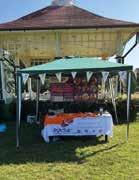

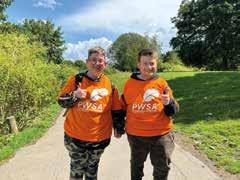
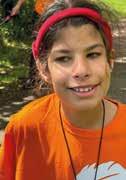

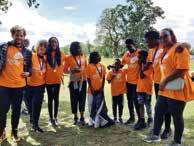
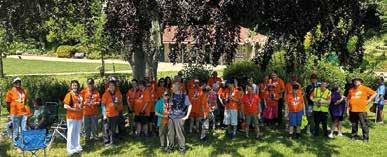
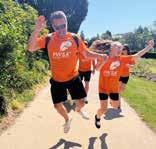
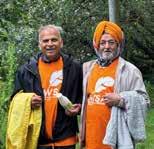
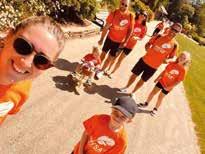
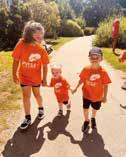
This is often something we don’t like to talk about but it is so important to prepare for the future and look after your family. Legacies are so valuable to PWSA UK and have helped us through some very difficult times. A 1% legacy in your will can make all the difference to our charity. For more information, please contact Kwilkinson@pwsa.co.uk

We are delighted to welcome to the team Myles Kelly, a name that will be familiar to many in our community.
Myles joins us as project manager focusing on assessing how PWSA UK can influence residential settings for adults with PWS to ensure they receive the best possible standards of care and quality of life – something that we know will be hugely important to individuals and families across our community.

25 North West Christmas Party, 12.30pm-4.30pm, at St Paul’s Parish Hall, Clap Gate Lane, Wigan. Please contact Sarah at sbrindle@pwsa.co.uk for further information.
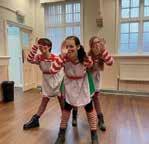

Myles brings to the role a wealth of experience in the field of PWS, having worked with and supported adults with PWS since 1986 through a national care provider, where he played a central role in developing, maintaining and improving the standards of PWS care and support, as well as keeping abreast of the latest news and insights from around the PWS world by attending national and international conferences and training events.
Myles says: “In all that time I knew that I would simply never stop learning about PWS, no matter how many conferences I attended nor how much I read!
“I’m sure I am who I am today because of the many people with PWS I’ve supported and cared for, not to mention their amazing families. Working for and with PWSA UK will be the icing on my professional cake!”
3 Christmas Party in Scotland. Please contact Sarah at sbrindle@pwsa.co.uk for further information.
3 Christmas Party in the West Midlands. Please contact Ruth at rconsterdine@pwsa.co.uk

21st April - London Marathon – spaces are filled for 2024 but please email Karen at kwilkinson@pwsa.co.uk to register your interest in 2025.
May (date TBC) - PWS Community Weekend at Sundrum Castle, Scotland. Details coming soon.
4th May - Tottenham Skywalk. Please email Lizzie at lpratt@pwsa.co.uk for further information.
17th-20th May - PWS Community Weekend at Southview Holiday Park, Skegness. Find out more about how to register and book at pwsa.co.uk/events
23rd June – Skydive, TBC. To register your interest please email Karen at kwilkinson@pwsa.co.uk
6/7th July – Snowdon sunrise walk. Please email Lizzie at lpratt@pwsa.co.uk for further information.
7th July- Parallel Windsor. Please email Karen at kwilkinson@pwsa.co.uk for more information.
8th September – Great North Run. Please email Karen at kwilkinson@pwsa.co.uk for more information.
20th-23rd September - PWS Community Weekend at Sandford Holiday Park, Dorset. Find out more about how to register and book at pwsa.co.uk/events
For the most up-to-date event information, please visit pwsa.co.uk/events.